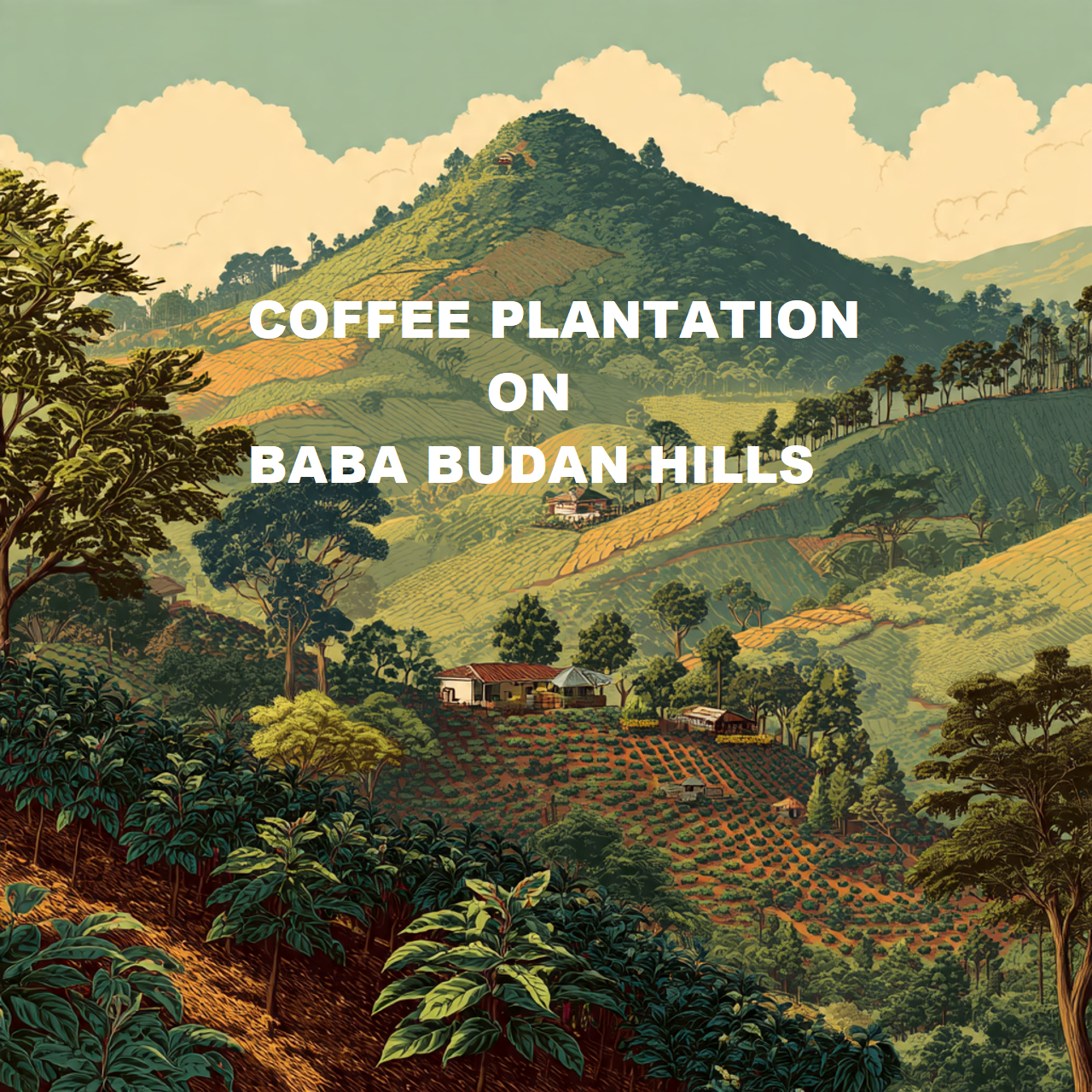Baba Budan Hills – Sustainable coffee farming practices
Baba Budan Hills in Karnataka are the birthplace of Indian coffee, and today they themselves demonstrate how sustainability can redefine farming in present times. Here, ancient wisdom gets combined with newer practices, and therefore, coffee farmers turn towards nature-friendly farming that ensures soil and biodiversity conservation.
Additionally, farmers increasingly use shade-grown methods, which not only ensure improved bean quality but also conserve native forests. Simultaneously, organic manures and water-harvesting systems minimize chemical reliance while enhancing long-term yields.
Additionally, intercropping spices and fruits diversifies sources of income as well as enhances ecological resilience. As such, these methods construct a resilient agriculture system that is favorable to local people and the environment.
Above all, sustainable coffee production in Baba Budan Hills constructs global goodwill through its ethical production and quality flavor. Therefore, this area presents a living example in which heritage, nature, and economy coexist in harmony.
Introduction to Sustainable Coffee Farming in Baba Budan Hills
Situated in the Karnataka State’s Western Ghats, Baba Budan Hills are the cradle of Indian coffee and now consciously represent a move towards eco-friendly cultivation.
Ancient customs perfectly blend with new green methods of cultivation, and therefore, farmers effectively safeguard biodiversity while improving the quality of crops.
Further, they practice shade-grown cultivation, which not only preserves forest cover but also enhances the flavor and fragrance of Arabica beans.
Concurrently, natural pest control and organic fertilizers minimize reliance on chemicals, while rainwater harvesting systems save valuable resources.
Besides, intercropping with spices and fruits diversifies income, and thus enhances ecological balance and economic resilience as well.
In addition, fair-wage, community-supported programs give value to small farmers, while demand for ethically produced coffee persists globally.
Finally, the Baba Budan Hills show how heritage, sustainability, and innovation can coexist, and thus they present a living example of sustainable agriculture.
Why Baba Budan Hills Are Ideal for Coffee Cultivation?
Baba Budan Hills are well-suited for coffee growth, and a number of conditions are responsible for this.
To start, the elevation of the region, which is from 1,000 to 1,200 meters, provides a moderate climate, and Arabica beans, as a result, gain deep flavor and aroma.
Also, with high rainfall coupled with well-drained laterite soils, optimal growth conditions are present, and frequent mist and humidity shield plants against harsh temperatures.
In addition, the high forest cover provides natural shade, and consequently, coffee plants flourish without high chemical applications.
Meanwhile, the biodiversity of the region maintains pest management and soil health, further promoting crop quality.
Farmers also enjoy traditional knowledge transmitted from generation to generation, and thus, they are able to practice effective pruning, planting density, and intercropping.
In addition, access to markets within Chikmagalur and Mysuru makes it possible to transport the fresh beans timely, ensuring quality.
Overall, these factors combined make Baba Budan Hills not only desirable but ideal for sustainable coffee production.
Traditional Farming Methods Preserved in Baba Budan Hills
In Baba Budan Hills, farmers consciously maintain conventional methods of coffee farming, and these same conventions still influence sustainable farming in the area.
In the first place, they use hand-picking to get ripe coffee cherries, which means higher quality beans, and at the same time, reduces plant damage.
Furthermore, farmers maintain natural shade by cultivating coffee beneath forest cover, and therefore, they conserve local biodiversity and decrease the application of chemical fertilizers.
While this is happening, organic waste composting and natural pest management enhance soil health and plant resistance.
Besides, coffee intercropping with spices, cardamom, and fruit trees promotes income diversification and ecological balance.
Farmers also observe seasonally sensitive pruning and spacing, which increases plant health and productivity.
In turn, these traditional practices not only conserve culture but also ensure environmental sustainability.
Finally, conventional agriculture in Baba Budan Hills shows the way experience, attention, and environmental consciousness come together to yield quality, ethically cultivated coffee.
Shade-Grown Coffee: Protecting Forests and Enhancing Flavor
Shade-grown coffee in Baba Budan Hills is actually showing us the way farming can save forests while improving flavor.
Farmers first grow coffee in the natural shade of indigenous trees, and thus they preserve forest cover and avoid erosion.
Further, shaded conditions control temperature and moisture, reducing not only plant stress but also bean quality.
Simultaneously, varied trees are a habitat for insects and birds, and thus they maintain natural pest control and conservation of biodiversity.
Also, shade inhibits the ripening process of coffee cherries, and hence beans mature with deeper flavor and aroma.
Moreover, it minimizes the use of chemical inputs, but enhances long-term soil fertility.
When farmers maintain conventional shade-grown systems, they also reinforce the environmental balance of the Western Ghats.
Finally, shade-grown coffee from Baba Budan Hills demonstrates that environmental stewardship and great taste can coexist in environmentally friendly farming.
Organic and Eco-Friendly Practices Adopted by Farmers
Above all, Baba Budan Hills farmers actively substitute chemical fertilizers with organic compost, and this process nourishes the soil naturally.
In addition, they implement vermicomposting that not only recycles farm waste but also yields nutrient-rich manure.
Along with that, farmers apply natural pest repellents such as neem extracts, and thus they minimize chemical pesticide reliance.
Besides, they carry out rainwater harvesting and, as such, save water for irrigation during dry seasons.
Additionally, intercropping with spices and fruits makes yields diversified, while, at the same time, it sustains ecological stability.
Apart from that, they have shade-grown systems, which preserve forests and modify microclimates.
Likewise, they conserve indigenous tree species and, as a consequence, increase biodiversity on plantations.
In addition to that, farmers embrace mulching, which saves soil moisture and reduces erosion.
Therefore, they reduce carbon emissions by employing the use of old hands rather than machinery.
Finally, these sustainable practices enhance coffee quality, improve farmer resilience, and encourage sustainable agriculture to future generations.
Community Benefits of Sustainable Coffee Farming
In the first place, sustainable coffee production generates rural employment opportunities, and therefore it inhibits rural migration.
Secondly, farmers receive improved incomes via premium prices, and as a result, living standards enhance.
Furthermore, women engage in farming actively, and thus families enjoy social empowerment.
Thirdly, cooperatives build close community relations, while assuring fair trade practices.
Fourthly, profits finance village schools, and as a consequence, children receive improved education.
Apart from this, medical facilities upgrade, as communities spend money in clinics and medical camps.
Likewise, farmer skills are enhanced through training programs, and thus, youth get better opportunities.
Apart from this, tourism near plantations attracts people, and hence it generates additional income.
For this reason, natural resources are saved by sustainable practices, and thus it comes to the advantage of both farmers and local people.
Finally, sustainable coffee farming benefits the whole society, and thus it brings long-term social and economic prosperity.
Future of Sustainable Coffee Production in Baba Budan Hills
The future of eco-friendly coffee cultivation in Baba Budan Hills appears bright, and a number of trends individually reflect this increase.
For starters, increasing global demand for organic and ethically grown coffee prompts farmers to follow green practices, and hence they are able to command higher prices in the market.
To add to this, government schemes and voluntary agencies positively enforce rainwater harvesting, organic certification, and conservation of biodiversity, and thereby farmers receive technical and financial assistance.
Concurrently, new generations are developing an interest in coffee cultivation and, as such, ancient knowledge is blended with advanced innovations.
In addition, the increasing popularity of eco-tourism among coffee plantations offers communities a new income, while at the same time making people aware of sustainable methodology.
Finally, partnerships with global buyers promote Baba Budan Hills coffee globally.
Finally, the future lies in finding equilibrium between heritage and innovation, and hence, sustainable coffee agriculture here can flourish as an international model of responsible agriculture
FAQs on Baba Budan Hills For Competitive Exams
1. Where are the Baba Budan Hills situated?
These Hills are situated in the Chikkamagaluru district of Karnataka, India.
2. Why are the Budan Hills renowned?
These Hills are renowned as they are the birthplace of coffee plantation in India.
3. Who brought coffee to these Hills?
Baba Budan, a 17th-century Sufi saint, brought coffee to these hills by importing beans from Yemen.
4. Which mountain range does the Baba Budan Hills belong to?
The Hills belongs to the Western Ghats.
5. What is the Mullayanagiri Peak, the highest point in the Baba Budan Hills?
The Mullayanagiri Peak, with an elevation of 1,930 meters, is the highest point.
6. What type of coffee do farmers primarily grow in Baba Budan Hills?
Farmers primarily grow Arabica coffee.
7. Why are the Budan Hills significant for biodiversity?
The Hills contain forests, conserve wildlife, and have shade-grown coffee plantations.
8. Which minerals are found in the Baba Budan Hills?
The Hills have iron ore and other precious minerals.
9. How do the Baba Budan Hills impact Karnataka’s tourism?
It contribute to tourism through trekking, coffee plantation stays, and natural attractions.
10. Why are competitive exams regularly referring to Baba Budan Hills?
Competitive exams refer to these Hills since they are endowed with historical, geographical, agricultural, and economic significance
Conclusion:
Lastly, sustainable coffee cultivation in Baba Budan Hills illustrates how tradition and innovation can coexist. To begin, the transition to sustainable methods showcases how farmers shield both soil and diversity. Further, the optimal conditions for farming—ranging from altitude to rainfall—provides the perfect setting for high-quality beans.
Meanwhile, traditional farming techniques conserve cultural heritage while ensuring environmentally friendly results. Moreover, the shade-grown coffee system preserves forests and enhances flavor, demonstrating that quality and environment are inseparable.
Additionally, farmers use organic and environmentally friendly methods like composting and intercropping, which minimize chemicals and increase resilience. Likewise, the social benefits of sustainable agriculture enhance local livelihoods and deepen social connections.
Finally, the future of coffee farming in these hills is bright, as eco-tourism, fair markets, and innovations by farmers enlarge opportunities. Thus, the Baba Budan Hills are a living example of sustainable agriculture.
So, will you opt for sustainable coffee that saves nature and tradition? Comment.






0 Comments